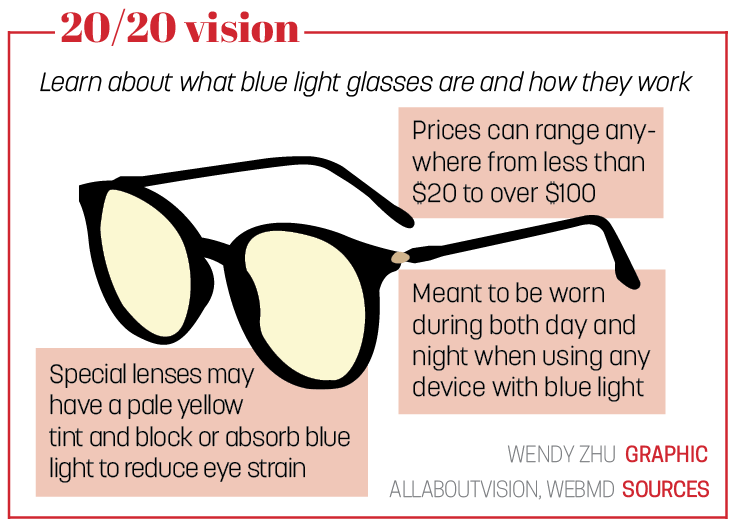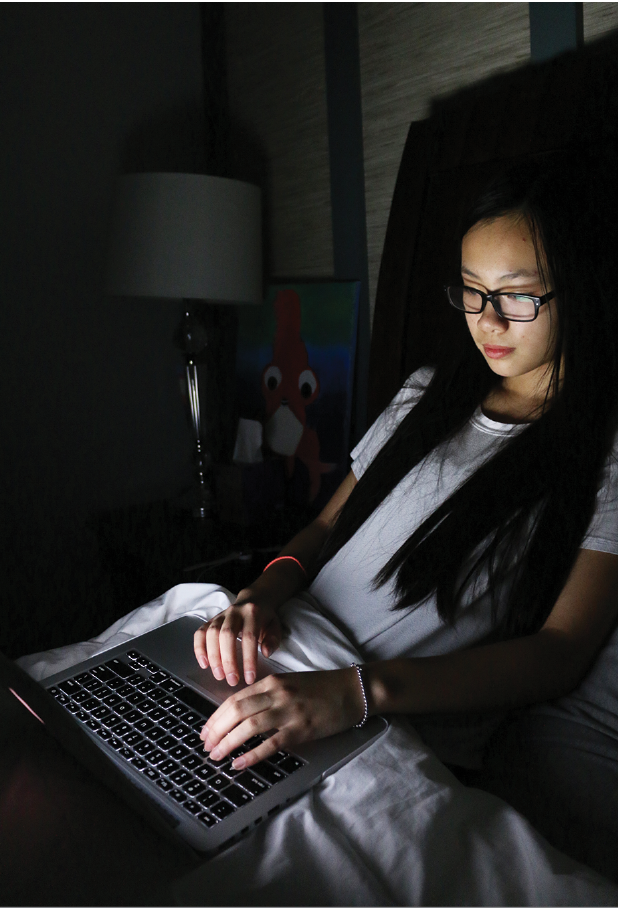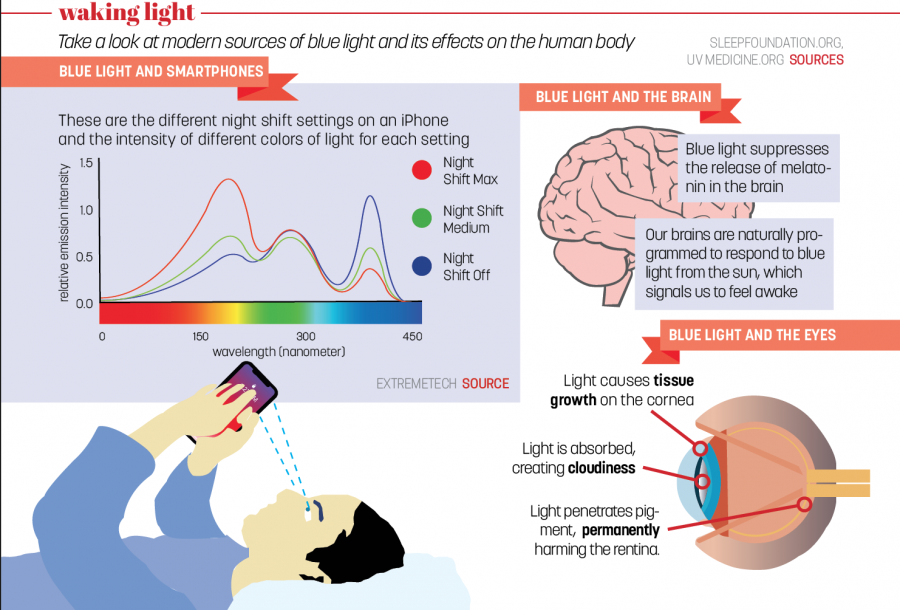When sophomore Sophie Zhou arrives home from school each day, she takes a nap for a couple of hours before starting on her homework and then finally goes to bed around 1 a.m. Depending on how much homework she has, she may stay up even later. This routine means she has to look at blue light-emitting technology before she finally goes to sleep for the night.
She said, “(Since) I have more online homework, I tend to spend more time on the computer and do homework later at night, so I would get less sleep that way.”
Zhou said she does not think exposure to blue light before sleeping impacts the quality of her sleep and said she hasn’t noticed much difference between using blue light sources right before she goes to sleep and not using them.
This anecdotal evidence supports a recent study conducted by researchers at the University of Manchester which found that in fact, yellow light negatively affects sleep more than blue light. This confirmed the researchers’ hypothesis that darker light, like blue light, would mimic the darkness of twilight, and warmed-toned light, like yellow light, would mimic the brightness of daytime, ultimately causing yellow light to disturb one’s sleep more than blue light.
Despite these findings, blue light is often treated as more of a concern to our health than other colors because it contains more energy per photon of light. This means blue light is more likely to damage our bodies when absorbed by cells in higher doses.
Unlike Zhou, freshman Taehee Kim said he started actively trying to avoid contact with blue light before sleeping about two months ago.
Kim said, “I read some articles and studies that show that blue light causes disturbances in my sleep, and I wanted to try it out to see if it really will help me get better sleep.”

Kim said he found he has been able to fall asleep much quicker and get a better night’s rest overall since trying to avoid blue light.
Derek Moser, health and wellness education teacher, said for him, being on his phone before trying to sleep is a major factor in the quality and amount of sleep he gets each night; however, he said that may be more due to it being a distraction than the type of light it emits.
“I try not to spend too much time on my phone before when I’m in bed. I think for me it’s more because I can spend an hour on my phone when I should be sleeping,” he said. “So it’s kind of just getting rid of it and putting it down and away from me so I can’t grab it.”
Like Zhou, Kim said having more online homework leads him to stay up later at night in order to complete that homework.
“I believe that the more homework I have online—since I do homework later in the night—affects me since I try to stay away from it, but I can’t since most of my homework is online, so I have to reluctantly look at the blue light,” Kim said.
Additionally, Zhou said she believes reducing the amount of online homework could potentially help students’ sleep schedules.
“I get mostly online homework, and that’s changed a lot from last year, but I think that online homework is beneficial in some ways. You’re less likely to forget something at home, so you’re more accountable for having (the homework) done,” Zhou said.

Sophomore Sophie Zhou uses her laptop in the dark. She said she often gets online homework, which forces her to look at blue light at night.
Moser said that regardless of whether or not students view blue light before going to sleep, the overall impact that lack of sleep can have on a teenager’s developing body is immense.
“(Sleep deprivation) causes more stress, physical ailments, illnesses and has a huge effect cognitively,” Moser said. “It’s just not healthy; you really need sleep.”
Personally, Kim said even if the new study debunks blue light’s effect on sleep, he will still continue to avoid it, as he said it works for him and his sleep schedule.
“In the end, it’s just how my brain perceives it,” Kim said. “If it really doesn’t affect me that much, but I believe it does, I trick my brain and get a good night’s rest.”
Zhou said she normally ends up using blue light sources later at night due to procrastination and has not found any significant effects of blue light on the quality or amount of sleep she gets.
“Trying to avoid blue light is not really something that I think about,” Zhou said. “It’s more that I end up doing (online) homework at night, so I end up using sources of blue light (late at night).”
Check out a story about the effects of smartphone use on eyes here.



















![Joseph Broman, Mu Alpha Theta sponsor, grades tests for his honors precalculus/trigonometry class. Broman said, “I’m retiring from the Math Club next year and I’m just going to do Mu Alpha Theta so I can focus on that one and we can do more [speaker series] first semester.”](https://hilite.org/wp-content/uploads/2024/03/IMG_9502-1200x900.jpg)











![British royalty are American celebrities [opinion]](https://hilite.org/wp-content/uploads/2024/03/Screenshot-2024-03-24-1.44.57-PM.png)




















![Review: “The Iron Claw” cannot get enough praise [MUSE]](https://hilite.org/wp-content/uploads/2024/04/unnamed.png)
![Review: “The Bear” sets an unbelievably high bar for future comedy shows [MUSE]](https://hilite.org/wp-content/uploads/2024/03/unnamed.png)
![Review: “Mysterious Lotus Casebook” is an amazing historical Chinese drama [MUSE]](https://hilite.org/wp-content/uploads/2024/03/0.webp)
![Thea Bendaly on her Instagram-run crochet shop [Biz Buzz]](https://hilite.org/wp-content/uploads/2024/03/IMG_0165-1200x838.jpg)
![Review: Sally Rooney’s “Normal People,” is the best book to read when you are in a time of change [MUSE]](https://hilite.org/wp-content/uploads/2024/03/20047217-low_res-normal-people.webp)
![Review in Print: Maripaz Villar brings a delightfully unique style to the world of WEBTOON [MUSE]](https://hilite.org/wp-content/uploads/2023/12/maripazcover-1200x960.jpg)
![Review: “The Sword of Kaigen” is a masterpiece [MUSE]](https://hilite.org/wp-content/uploads/2023/11/Screenshot-2023-11-26-201051.png)
![Review: Gateron Oil Kings, great linear switches, okay price [MUSE]](https://hilite.org/wp-content/uploads/2023/11/Screenshot-2023-11-26-200553.png)
![Review: “A Haunting in Venice” is a significant improvement from other Agatha Christie adaptations [MUSE]](https://hilite.org/wp-content/uploads/2023/11/e7ee2938a6d422669771bce6d8088521.jpg)
![Review: A Thanksgiving story from elementary school, still just as interesting [MUSE]](https://hilite.org/wp-content/uploads/2023/11/Screenshot-2023-11-26-195514-987x1200.png)
![Review: When I Fly Towards You, cute, uplifting youth drama [MUSE]](https://hilite.org/wp-content/uploads/2023/09/When-I-Fly-Towards-You-Chinese-drama.png)
![Postcards from Muse: Hawaii Travel Diary [MUSE]](https://hilite.org/wp-content/uploads/2023/09/My-project-1-1200x1200.jpg)
![Review: Ladybug & Cat Noir: The Movie, departure from original show [MUSE]](https://hilite.org/wp-content/uploads/2023/09/Ladybug__Cat_Noir_-_The_Movie_poster.jpg)
![Review in Print: Hidden Love is the cute, uplifting drama everyone needs [MUSE]](https://hilite.org/wp-content/uploads/2023/09/hiddenlovecover-e1693597208225-1030x1200.png)
![Review in Print: Heartstopper is the heartwarming queer romance we all need [MUSE]](https://hilite.org/wp-content/uploads/2023/08/museheartstoppercover-1200x654.png)























![Review: Ladybug & Cat Noir: The Movie, departure from original show [MUSE]](https://hilite.org/wp-content/uploads/2023/09/Ladybug__Cat_Noir_-_The_Movie_poster-221x300.jpg)

![Review: Next in Fashion season two survives changes, becomes a valuable pop culture artifact [MUSE]](https://hilite.org/wp-content/uploads/2023/03/Screen-Shot-2023-03-09-at-11.05.05-AM-300x214.png)
![Review: Is The Stormlight Archive worth it? [MUSE]](https://hilite.org/wp-content/uploads/2023/10/unnamed-1-184x300.png)


